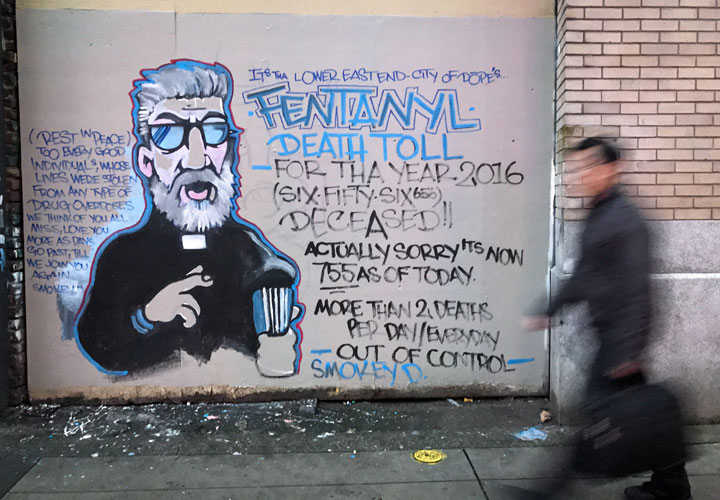People in B.C. are more likely to die from an illicit drug overdose than from Alzheimer’s disease, liver disease and suicide, according to numbers from the B.C. Coroner and the provincial statistics agency.

The B.C. Coroner announced Wednesday that 914 people died of a drug overdose in the province in 2016. That’s on average, about five deaths every two days.
While numbers on other causes of death for 2016 are unavailable, comparing them to 2015 deaths reveals just how severe the drug overdose problem in B.C. is.
The most common causes of death in B.C. are serious diseases and medical issues: cancer, heart disease, stroke, lung disease and others. Accidents, of all kinds, are common too.
Drug overdose first entered the top 10 in 2015, when there were 510 deaths. Assuming that the numbers of people dying from other causes have remained somewhat steady, drug overdose has moved up the list in the last year, falling just behind influenza – a virus for which the provincial government provides high-risk individuals with free vaccines.
Numbers provided by the province’s Vital Statistics Agency on accidental deaths also include drug overdoses and couldn’t be separated from non-overdose accidental deaths. This means that the number of non-drug-related accidents is likely much lower.
B.C. declared a state of emergency regarding opioid deaths in April 2016. During that announcement, the government predicted that the province could see between 600 and 800 deaths that year if special steps weren’t taken. It actually exceeded that number.
“I think that’s the most shocking part, is that it was actually predicted that this would be a leading cause of death,” said Bruce Wallace, a collaborating scientist with the Centre for Addictions Research of B.C.
“How many more of these deaths could have been prevented? What additional steps were necessary to be taken?”
The number of drug-related deaths has grown each month in the province, with December being the worst month yet with 142 deaths.
In October, the coroner estimated that roughly 60 per cent of overdose deaths involve the opioid fentanyl.
Although the crisis happened “quite quickly,” Wallace thinks that part of the problem was that the approach to drug use for so long had been to criminalize and marginalize drug users. This hampered efforts to help them when the crisis took hold, he said. Legal regulations had to be changed to allow people to administer naloxone outside a hospital setting, for example.
“I think what the crisis has really shown is that keeping substances illicit is really too dangerous to tolerate in our society,” he said. He would like to see more rapid access to things like prescription heroin and other opiate substitution therapies, which he believes could help individuals at risk of overdose.


Comments